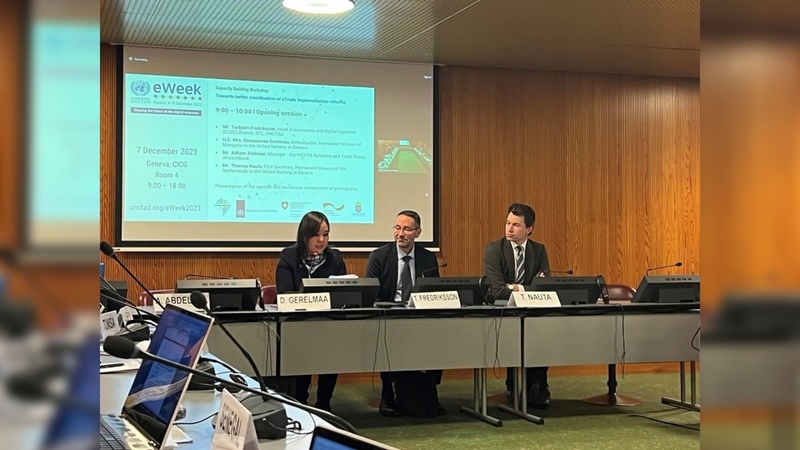
AKIPRESS.COM - Mongolian delegation, led by Permanent Representative Gerelmaa Davaasuren, participated the UNCTAD's eWeek under the theme of "Shaping the future of the digital economy" on December 4-8, Montsame reports.
On the fifth day of the eWeek, a thematic session was held to launch the e-Trade Readiness Assessment of Mongolia, which was jointly formulated by the government of Mongolia and the UNCTAD between 2022-2023.
The session was opened by Minister of Digital Development and Communications of Mongolia Uchral Nyam-Osor and Director of the Division on Technology and Logistics of the UNCTAD Shamika Sirimanne.
The assessment identifies the main barriers and opportunities for e-commerce development in the seven eTrade for all policy areas by providing a detailed diagnostic of the digital ecosystem and identifying key policy reforms to accelerate the transition to an inclusive and sustainable digital economy.
Participants in the session were introduced to the main findings and recommendations. A discussion geared towards the development of e-commerce and digital ecosystem was held between development partners and relevant stakeholders involved in the digital transformation of Mongolia.
According to the findings, Mongolia is in the initial phases of e-commerce development. Elaborating an e-commerce strategy is crucial to enhance inter-ministerial coordination and foster public-private dialogue.
While Mongolia has a relatively well-developed ICT infrastructure, the speed and quality of Internet connection are still low compared to regional and international standards. Additionally, households in rural areas continue to face limited access to the Internet, the report said.
Trade logistics and trade facilitation are major challenges in Mongolia. The country's large territory, coupled with aging infrastructure, negatively impacts the competitiveness of the transport services sector. Improving cross-border trade and logistics is perceived as the most pressing factor for fostering e-commerce development.
E-banking, mobile banking, electronic wallets, QR code payments and payment cards are widely used for domestic electronic transactions in Mongolia. However, the availability of cross-border payment options is limited.
Mongolia's e-commerce regulations only partially align with international standards and are not widely known among stakeholders. Implementation of these regulations also remains a challenge. Developing ICT skills is crucial for the future growth of e-commerce in Mongolia.
Limited access to financing presents a significant entry barrier for Mongolian micro, small, and medium-sized enterprises (MSMEs) looking to engage in e-commerce. While there are some financing options available for digital and technology innovation startups, seed funding sources are limited, as most institutional lenders or grantors require evidence of organizational continuity.
